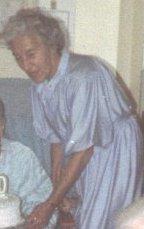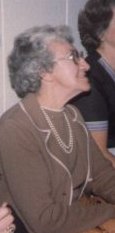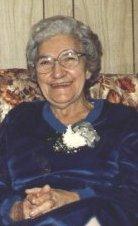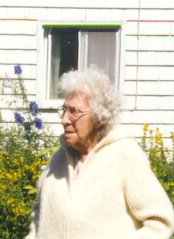







The funeral Mass was celebrated on November 23rd at Stella Maris Church for Annie Dixon. Fr. Cormier, the parish priest officiated, and in his sermon told us that he didn't know Annie in her younger years, but asked some of the people, that knew her. They described her as a wise and gentle woman, concerned with her commitments as a teacher, of which she was one of the best in the county, he was told, and also with the lives and people of the town. She was a person who cherished her immediate and extended family. Then, he went on to tell us that what he could recount as his personal experience was she was a devout Catholic. He said that he admired her because she had a fear of God, which is not commonly seen. He described the fear of God as not being terrified or frightened of God, but of a sense that you may not spend eternity in Heaven, so to that end, you live every day of your life, with joy, doing God`s work, to be able to be with Him in the next life. That is what he Felt when he was with Annie Dixon. The hymns that were sung were perfect for her. One was "Here I am Lord" and the other was "Gentle Woman." Both reflected the personality and ways of the person I knew and loved. I think she would have been very pleased with the whole Mass, although quite modest with the tributes that were paid to her. Family in attendance were Marion, husband and son, Allistar and wife, Thomas, wife and children, Hannah and Marion Mac Millan. Bobby was unable to attend. Extended family.. were Billie Mac Lellan (John Leo) her daughter Debbie and husband Peter, Angus Allen`s daughters, Allison, and Catherine, and Frank, Louise and Anne (Francie`s). -- Anne (Mac Isaac) Cummings
The first member of the MacIsaac family that we can name was Donald born in 1685. We do not know much about him except that we can deduct from his age and the census of the small isles of 1764 that he probably had two brothers, Angus and Evan More. Angus was born in 1684 and Evan More about 1691. Also, we know that there were at least two generations of MacIsaacs that lived on the Island of Canna before this. We discovered this from a statement of Donald MacIsaac born in 1843 on Canna, who was the great great grandson of the above Donald (1685). He was also the great grandfather of Joyce (McCallum) Hunter of Glascow, Scotland. Joyce is a descendant of another Donald (1761), who was the brother that stayed in Scotland when the others emigrated to Nova Scotia. Also, one of Joyce's grand uncles, Allan MacIsaac, and our grand uncle, Dr. Bill MacIsaac, met on a ferryboat on the way to Canna during the First World War. Captain Johnny was grandpa's (Lewis) brother from Antigonish.
Evan More was about fifty-five years old at the time of the battle of Culloden, which took place on April 16, 1746.This was the battle of the Highlanders against the English to put Bonnie Prince Charlie (Charles Edward Stewart) back on the throne of Scotland. It was a massacre of the Highlanders. Those who survived fled to the hills and islands. The MacIsaacs of Canna do not appear on the roster of Culloden, but it is likely that they changed their names. In the census of 1764, they called themselves McQueen. This was probably to protect the family from the English and also the anti Catholic sentiment of the times. This census is a blatant anti-Catholic document.
There is a written account by Alexander MacDonald on the Hanoverian atrocities on Canna involving Evan More and his wife. On April 15, Captain Duff and Captain Ferguson of the Commodore came from the Island of Skye to Canna to harass the people. They had previously forced the people to give them beef and mutton. Since the young men were gone to Culloden, the bailie of Canna, James MacDonald decided it would be safer to give in. So the islanders slaughtered 20 fat cows and as many sheep for the English. The meat, however, began to rot because a storm came up, and the marines could not land. They refused to eat it and, instead, demanded 60 more heads of cattle. When the baile told them that this was unjust and cruel for the poor islanders, the Captain with his armed men gathered all the cattle on the island into a small creek and shot sixty of the best. What they did not use, they threw overboard and would not let the islanders touch a bite of it. All this had taken place earlier in the month, and on April 15, they arrived again.
The purpose of this next adventure was to rape the girls on the island. Fortunately for them, a young English marine with a conscience warned the islanders, and the girls were able to hide themselves in the caves. Evan More's two daughters were among those to escape, but his wife who was fifty years old and eight months pregnant felt she was safe from the young Englishmen. The marines furious that the girls had fled, went to Evan More's house with drawn swords. They tied him up and went after his wife, but she managed to escape into the quagmire. There she remained for the rest of the night until she was sure that the ship had left the harbor. She aborted the child and died the following night.
Neil, the son of Donald, probably was with the other young men at Culloden when this happened. He was born in 1724 and would have been about 22 at this time. He was not married until 1750 at age 26, and his wife Margaret MacQuarrie (written Margrat McGuary in the census) was born in 1727. Allan their oldest child was born in 1751 and is the ancestor of grandma (Bella) MacIsaac. Their youngest son Angus was born in 1770 and is the ancestor of grandpa (Lewis MacIsaac). Another son Donald (1761) was the ancestor of Joyce Hunter from Glascow, Scotland, and a daughter Anne (1752) was the wife of Roderick MacLlean of the Billy D.R. MacLeans of Inverness. There were three other daughters that stayed in Scotland: Rachell (1755), Marion (1757) and Christina (1762). The son Archibald (1759) settled in New York and another son John (1758) we know nothing about. -- Terry (Mac Isaac) Johnson
The great benefit of studying one's genealogy is the insight one gets into understanding oneself, if only for the examination of identical genetic clumps we seem to share. What is most interesting is how this sameness manifests in such variation in personality and character. Yet, there seem to be core traits that distinguish clan from clan, that endure and serve as patterns for future generations, that establish an identity and, thus, allow us to understand our gifts and potentials in a real way.
As members of the Mac Isaac and Gills Clans, we can all stand proud and filled with hope that Annie Dixon's life has once again defined who we are. We are Nurtures. We are highly skilled at nurturing. We have an empathic nature that is almost unfair, in that we feel so much for others. Annie Dixon nurtured her family and most of the children of Inverness for many years. She nurtured her relatives, friends, and the community. She taught a wide variety of subjects in her career and even had a classes where she was the only teacher for grades 1 to 6, and all the children were taught in one classroom in one small school house-- her second home. Her efforts to teach empowered many children to gain skills to grow and reach their potential, but ironically, what she more profoundly taught to all of us, was to have the utmost positive regard for all people. I do not ever remember anybody ever talking about Annie without the highest respect. When I was in her presence, she always made me feel warm, welcomed, and respected, and she always left me intellectually stimulated, and often fascinated with her insights. Annie Dixon taught naturally-by action and character by simply who she was. Annie Mac Isaac Dixon is very much a part of the best of the Mac Isaac Legacy, and I am so proud -- so very proud -- to say that she was a member of my family.
I am pleased to hear your first MacIsaac Newsletter is dedicated to Annie Dixon. I have many fond memories of Annie as my first teacher at the Corner school, as a teacher on staff when I was principal, and as an understanding neighbor who kindly looked the other way when a few MacIsaac kids scrambled over the fence for a few of her delicious apples.
I first heard of Annie Dixon in the summer of 1947 prior to starting school. On several occasions I heard " His teacher will be Annie Dixon. She is a good teacher and will understand. " Ignoring the positive reviews, I refused to go to school for reasons to complex to discuss in this newsletter. Annie was my primary teacher in 1948. As a student you knew she cared and wanted you to succeed.
One of my concerns when appointed principal of Inverness Consolidated School in 1966 was having several former teachers, including Annie, on staff. Annie's visits to my office with problems were rare and always involved discussions on how to help students. Although neither of us realized it, she had a profound influence on my administrative style. I had such respect for Annie I would always listen to her concerns and ask what she thought was the best solution. I soon discovered most people, if given the opportunity and support, will arrive at their own solutions.
I am privileged to say that Annie Dixon was my teacher, my colleague and my friend. She touched the lives of generations of Invernessers. -- John (Butch) Mac Isaac
Just a quick note to inform you that the family reunion in Maine will be on Saturday, August 21, 1999. More information later. -- Terry
This Cape Bretoner was going on and on about how much she loves Canada...She said "My geez I love dis country. I love dis country of Canada so much dat I got a map of Canada tatooed on my arse...the only problem is dat now everytime I bends over....Quebec separates."